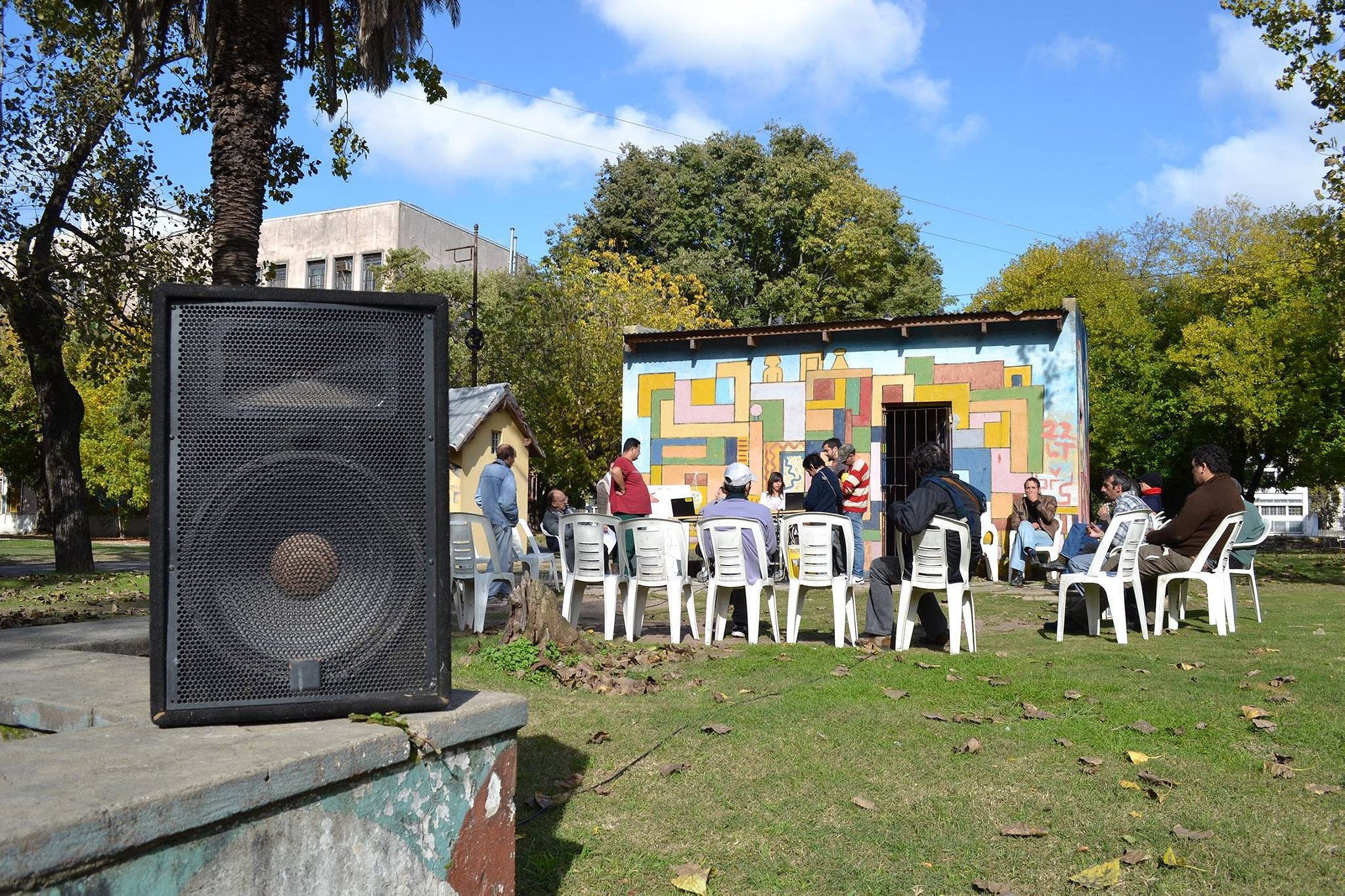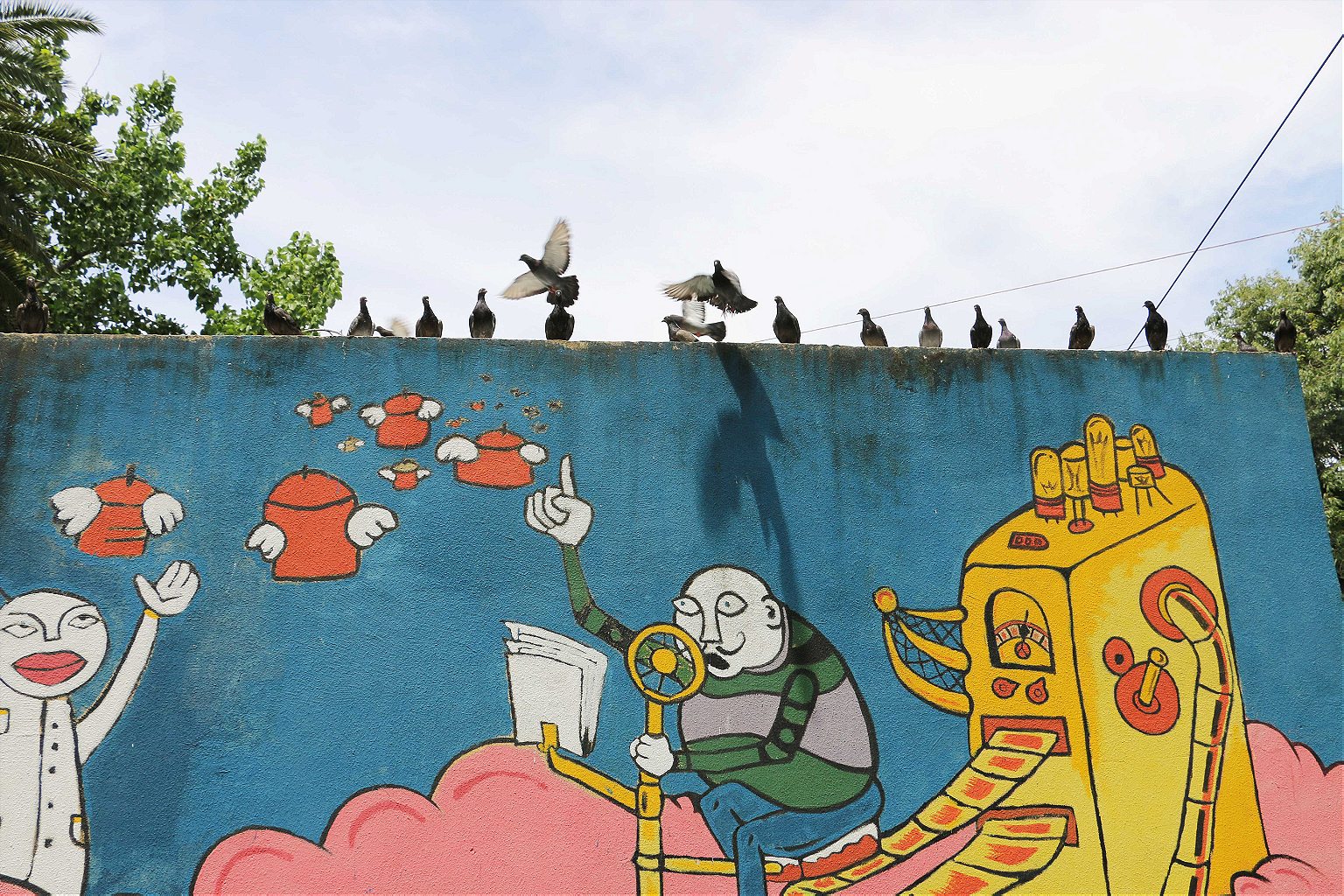In Buenos Aires, a radio show broadcast from a psychiatric hospital helps break down the stigma of mental illness.
“Hello, crazies!” a radio host greets his live audience on a chilly fall afternoon at Hospital Borda, a psychiatric ward in Buenos Aires. About 50 people, both patients and visitors, sit calmly on white plastic lawn chairs arranged in a circle, listening to the host and raising their hands for a chance to share.
“I am a crazy person among crazies,” one woman says when it is her turn. “But I feel protected in a place where we are all the same.” The group claps to show their support.
These conversations are broadcast throughout the country as part of Radio La Colifata, the first radio show in the world produced inside a psychiatric hospital. Psychologist Alfredo Olivera started the program in 1991 as a way for patients to reclaim their voices and shatter stereotypes about mental health. For 25 years, Radio La Colifata has produced a counter narrative to mainstream representations of mental institutions. Whereas mental health patients around the world are often pushed to the fringes of society, Radio La Colifata allows them to share their stories on their own terms. In turn, Argentines can understand mental illness by catching a glimpse of life inside Hospital Borda. Since Radio La Colifata began, more than 50 radio stations from Europe to Asia have replicated its model.
“Some people are scared of psychiatric hospitals because this is the image they sell in TV shows and movies,” said Fernando Aquino, former Hospital Borda patient and long-time Radio La Colifata participant. “What happens in a psychiatric hospital is normally totally closed and secret.” This isolation leads to misunderstanding, said Aquino, and thus generates fear.
Patients at Hospital Borda are treated for psychiatric disorders ranging from anxiety to schizophrenia. Some are released after a few months, but others stay for years. The public hospital has treated mental health patients in Buenos Aires for more than 150 years. Its future is now threatened by a potential development project.
In Argentina, laying down on a couch and sharing problems with a psychologist is the norm
In Argentina, laying down on a couch and sharing problems with a psychologist is the norm. The South American nation has one of the highest concentrations of practicing psychologists per resident in the world, more than 200 per 100,000 people, according to a 2012 study, compared to 33 per 100,000 people in the U.S. In Argentina, psychotherapy is seen as a tool for personal development. But having a psychiatric diagnosis still leads to social isolation.
“It’s true that there is a certain normalization of psychoanalysis [in Argentina] in the form of therapists, but people continue to reject people with a psychiatric diagnosis,” said psychologist Victoria Noguera, who supervises the Saturday radio sessions. “In this way, Argentina is not much different from other countries.”
At these Saturday sessions, a microphone is passed around, giving everyone their turn to speak, a privilege not always granted to patients being treated for mental illness whose thoughts, feelings, and opinions are often discredited for being irrational.
“This is a space that tries to accommodate people with different ways of being and existing in this world,” Noguera said. “It does this by creating communication with others” outside of Hospital Borda.

Listeners throughout Argentina can tune in to AM or FM radio to hear the innermost thoughts of Hospital Borda patients. In recent years, the program has begun broadcasting online to reach a wider audience. Each Saturday, the program begins with an open session, where patients can discuss their feelings and issues they are facing. Noguera is there to offer her professional advice, although she is clear to point out it isn’t personal therapy for the participants.
Then special programs begin, normally hosted by long-term patients and focused on their personal interests. For example, Ever, a patient from Bolivia, has a program that shares the music and culture from his country. A friend from outside the hospital often comes to the live recording, fulfilling the radio’s mission of merging the gap between inside and outside, according to Noguera.
Radio La Colifata serves an open invitation into Hospital Borda, where visitors are free to come and go as they please. The participatory nature of the show incorporates visitors in the program instead of creating and “us versus them” setting. The show is meant to be relatable to any listener, and so it creates an environment where patients are not defined by their mental illnesses.
“Mental health doesn’t mean just psychological or psychiatric treatment but also working on social relationships, education, work, and living conditions,” Noguera said. “We are also trying to help these people in all of these aspects.”
Statistics compiled by Radio La Colifata have found that regular participants have been readmitted to Hospital Borda at lower rates than patients who don’t attend.
Aquino, a middle-aged Buenos Aires-native, is one of these former patients. He shows up to a recent Radio La Colifata session dressed casually in a red t-shirt, jeans, and black rain boots to trek through the muddied courtyard. His shaved head reveals a tattoo of wings above the nape of his neck. His laid-back style and calm demeanor shatter the stereotype of typical mental hospital patient.
Aquino had his first mental breakdown in 1999 and was admitted to Hospital Borda. Feeling isolated and struggling to deal with his inner emotions, he began expressing himself through poetry that he read at Radio La Colifata, an empowering experience for the fast-talking Buenos Aires-native.
“The most important thing is that it gives you back your voice,” Aquino said. “When you enter into a psychiatric hospital, the first thing you lose is your voice.”

With the emotional support of Radio La Colifata, Aquino was released from Hospital Borda after about a year. He lost touch with the radio station as he tried to ease back into “normal” life. But transitioning to life outside of Hospital Borda proved more difficult than Aquino expected. In 2001, an economic crisis hit Argentina, closing banks and wiping out entire savings accounts. Aquino’s mental health deteriorated rapidly as a result of the economic blow and he found himself back at Hospital Borda being treated for anxiety.
Aquino once again connected with Radio La Colifata and has barely missed a Saturday since. It’s been more than a decade since Aquino was a patient at Hospital Borda, but he returns often as a visitor and radio host. The station gives him a creative outlet for his poetry and a community where he doesn’t have to hide his past for fear of being stigmatized or judged.
“It’s an activity that I’ve grown used to,” Aquino said. “I don’t have to keep it a secret that I am a person who has had psychiatric treatment and that I had this experience.”
Radio La Colifata has made significant strides to break down stigmas towards mental health patients, but deeply ingrained prejudices don’t vanish overnight. Those who have spent time at Hospital Borda often face discrimination even after they leave, including Aquino.
Aquino was working as a cook at a Japanese restaurant when he appeared on a national broadcast to discuss the radio show. A coworker saw him and mentioned it at work, out of support rather than malice. But the owner overheard and was not as compassionate. Just hours later, he asked Aquino to turn in his uniform.
Since this experience, Aquino produced a short film, Yo Soy Yo (“I am me”) to combat mental health stigma. The film features Aquino completing mundane tasks with a paper bag over his head, a representation of his feelings that he needs to hide his past in order to be treated with respect in Argentina.
“The ‘crazy’ person is the lowest on the social ladder,” Aquino said. “Stigma and prejudice live in some people’s heads.”
Radio La Colifata is a reason to live
Aquino continues to share his poetry over the airwaves through Radio La Colifata. His most recent poem tells the story of hospital patients awakened by the sounds of boots marching as police with riot gear fill the hospital. The poem commemorates the third anniversary of the day 400 city police officers entered Hospital Borda to demolish a building allegedly contaminated with asbestos. Forty people were injured and eight arrested.
The violent clash was part of an ongoing controversy surrounding a development project for a civic center that would use land near Hospital Borda. Patients and doctors at Hospital Borda oppose the plan introduced by President Mauricio Macri in 2011 when he was the mayor of Buenos Aires. They claim the city doesn’t have the right to the land and fear the project would mean the end of the whole hospital. City officials have said they don’t want to shut down the hospital and the proposed land for the project is city-owned.
The potential closing of Hospital Borda threatens the future of Radio La Colifata and the community that it has created over decades. For many like Aquino, Radio La Colifata has empowered them and made them feel at home.
“Radio La Colifata,” Aquino said, “is a reason to live.”